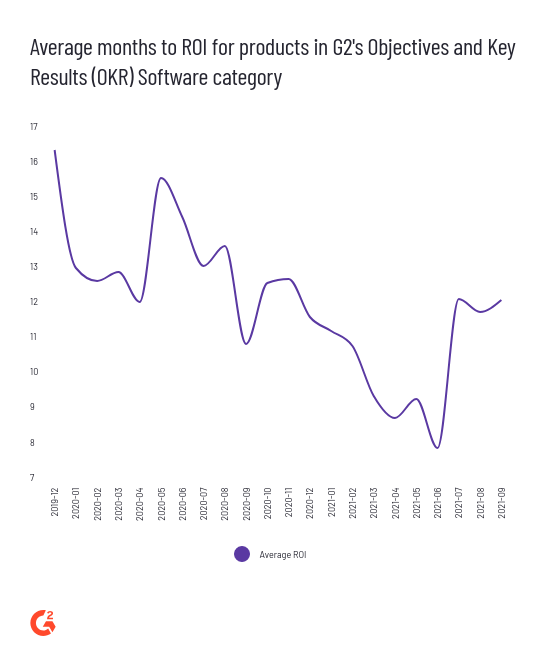Creating a great employee experience has been top of mind for HR professionals for years now. As the competition among employers for talent today is often fierce, it’s no longer enough to give employees a paycheck and benefits; they want to have a great experience coming to work.
But with remote work posing new challenges for people managers, and “the great resignation” heating up the war for talent as millions quit their jobs, companies are grappling with how to make employees feel supported and engaged—and how to retain them.
Software makers focus on employee experience
HR software makers understand this too, as evidenced by a splashy announcement in early October from one of tech’s biggest companies, although it’s a name that until fairly recently has not been associated with HR technology.
Microsoft revealed that it acquired Ally.io, which makes an objectives and key results (OKR) platform for tracking business goals.
What is Objectives and Key Results (OKR) Software?
OKR software helps companies set and monitor specific business goals on an individual, team, or company-wide level. Tracking progress towards goals can be a challenge for just about any business, especially now that many companies are working with teams that are partially or completely remote.Ally.io is in the Leaders quadrant on G2’s Objectives and Key Results (OKR) Software Category GridⓇ, with an average score of 4.6 out of 5 in its 139 reviews on G2. Prior to this acquisition, Microsoft did not have a presence in the OKR category.
It has been a big year for Microsoft, whose market cap passed $2 trillion this summer, in the employee experience space. The Washington-based company in February announced its new employee experience platform, called Microsoft Viva, putting other enterprise HR software makers on notice that the market for employee experience software is only going to get more competitive.
The pandemic and the employee experience
The concept of employee experience (sometimes abbreviated as EX) is multifaceted but generally refers to all of the elements that make up how a worker feels when working at a company, especially those that exist beyond a person’s specific day-to-day responsibilities.
G2 has categories that manage various elements of the employee journey:
It’s clear that the pandemic has had an impact on how employees feel while at work. In a Pew Research survey of employed adults last December, 23% of workers said they were less satisfied with their job compared to pre pandemic times.
Significantly, in the same survey, 33% were feeling less connected to their coworkers compared to before the pandemic and 19% reported fewer opportunities for advancement.
Source: Pew Research Center
To address this issue, HR tech vendors have moved toward consolidating the many tools that employees use into a single platform or dashboard. A key goal is to streamline employees’ access to the tools that they need to do their job and be supported by their company.
One compelling aspect about Microsoft’s incorporation of Ally.io in its Viva platform is that it casts OKRs as a component of the employee experience, though that connection might not be apparent at first glance. But how do tracking business metrics fit in with the larger employee experience? One explanation: employees who meet their individual goals (or help their team meet a collective goal) are more likely to feel like they are contributing meaningfully to the business’ success.
Doing a good job—and being recognized for it—are often themes that appear at the top of surveys on what motivates employees. If employees feel like their work is meaningful and is being recognized, they are likely to be more productive, more engaged, and more motivated to stay with the company.
When considering the ROI of platforms that manage OKR goals, there has been a fairly steady downward trend during the pandemic.

According to G2 review data, while companies in the early months of 2020 were seeing time to ROI in the neighborhood of 14 to 15 months on average, companies are now experiencing time to ROI of about 12 months on average. That number had dipped as low as 8 months this summer.
The data suggests software buyers are realizing the value of investing in tools to manage and report on employee, team, and company goals, especially with many managing a hybrid workforce.
Heightened focus on employee experience
Other major HR players have recently signaled a heightened focus on employee experience, demonstrating that they understand their clients’ need for more robust solutions in this area.
Also in October, Workday unveiled a new set of connectors called Workday Everywhere, which the company says “bring Workday tasks and insights directly into digital workspaces to help organizations elevate their employee experiences.”
Workday Everywhere will use machine learning to anticipate what actions an employee needs to take or which items require attention, such as suggesting that they take a vacation if they haven’t had time off recently. Employees can also access Workday data from other collaboration tools or digital workspaces, such as Slack or Microsoft Teams and Viva, creating what the company terms a “borderless experience.”
In April, Oracle announced the launch of Oracle Journeys, a new component of its human capital management (HCM) platform, designed as a kind of dashboard for getting answers to all kinds of HR questions, from parental leave to finding a mentor.
“With our homes doubling as offices over the past year, we’ve grown accustomed to the way technology improves our lives as consumers, and employees want that same experience at work,” said Chris Leone, senior vice president of development, Oracle Cloud HCM, in a press release announcing the new product. “Oracle Journeys will help HR teams provide value beyond traditional HR processes by tailoring unique experiences for their workforce.”
Expect employee experience innovations to continue
I’m not sure any company would say that they have yet mastered the art and science of delivering a great employee experience, given how rapidly our world has changed in this pandemic. Technology also can’t solve all of a company’s issues with the employee experience. If a company’s leadership doesn’t devote resources to learning or growth opportunities for its employees, for example, even the best employee experience platform won’t help.
But with so many companies being increasingly cognizant that the employee experience needs to be a priority in this new era of remote and hybrid work, we expect software vendors to continue to invest in new innovations in this space. It is one of the hottest areas of HR tech right now, and the competition is only going to get more intense.
Vous voulez en savoir plus sur Logiciel d'engagement des employés ? Découvrez les produits Engagement des employés.

Shaun Bishop
Shaun is a Market Research Manager and Senior Research Analyst for HR technology. His coverage areas include talent management, learning and development, recruiting, compliance, and HR administration. Before joining G2, he worked as a public high school teacher at schools throughout Chicago and as a journalist covering communities in the San Francisco Bay area. In his free time, he enjoys hiking, reading history books, and baking new things with his sourdough starter.
